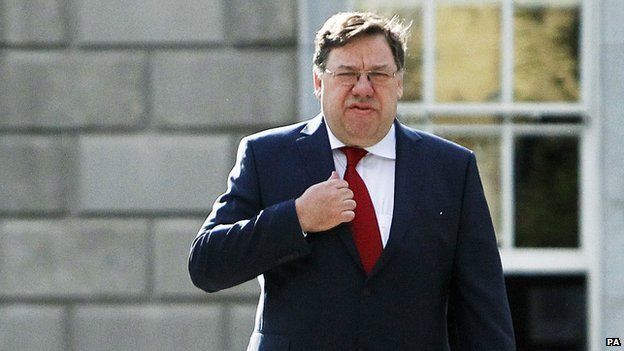Irish Banking Inquiry: Ex-PM Brian Cowen says impact of financial crisis could not have been avoided
- Published

Former Irish prime minister (taoiseach) Brian Cowen has said the impact of the financial crisis in the Republic of Ireland could not have been avoided.
Mr Cowen faced further questions on Wednesday at the inquiry into the causes of the Irish banking crash in 2008.
He said he took responsibility for his role as leader of the country in the downturn.
But Mr Cowen said his policies while in power were "plausible"
He said the Irish government's decisions were stress-tested against threats, but there was a "clear misjudgment of the risks and potential impacts".
Mr Cowen also said his approach was "broadly shared" even by political opponents.
He said at the time the public was questioning if spending on improved services and other investments was happening quickly enough.
Mr Cowen said if his government had spent less during the boom, the country would not have suffered as severely from the late 2000s.
However, he said that would have also meant fewer jobs and lower growth before the crash, which "would have in turn reduced our ability to come out of recession as quickly as we have".
"One way or the other the impact of the financial crisis has made the serious adjustment in the public finances which could not have been avoided in any event," he said.
Mr Cowen said that a bank guarantee was a safer option than nationalising Anglo Irish Bank which he said would amount to an open-ended guarantee.
He denied that he had overruled the then finance minister Brian Lenihan, who had favoured immediate nationalisation.
"I did not think nationalisation should be a first course and I said so," he said.
Mr Cowen said the two men had weighed up their options privately in his personal office, and that he had assured Mr Lenihan that Anglo could be nationalised if necessary some time in the future.
He said there was a consensus that Anglo could not be allowed to fail as it would cause a run on other banks and a meltdown of the entire system.
"It was Wall Street 1929 stuff," he said.
Mr Cowen apologised that there was no accurate and full note of the meeting, which, he said, would have been helpful.
He again denied that he spoke about banking during a golfing and dinner meeting at Druids Glen golf club with three serving or former Anglo figures, including chairman Sean FitzPatrick, just two months beforehand.
During his first appearance before the inquiry last week, Mr Cowen apologised for the "hardship and distress" caused to Irish people by austerity policies.
International bailout
However, he said the policies were "necessary" during the banking crisis.
The Republic of Ireland's banking sector had to be almost entirely nationalised when the bursting of a property price bubble coincided with a global financial downturn in 2008.
However, two years after issuing the blanket guarantee to prevent a run on Irish banks, Mr Cowen's government was forced to concede the banks' debts were too big and had to seek an international bailout.
Mr Cowen stepped down as taoiseach eight weeks after requesting a financial rescue package from the International Monetary Fund (IMF) and the European Union (EU).
The following month, his Fianna Fáil party suffered its worst ever defeat in a general election since the foundation of the state.
However, by December 2013, and after years of tough and unpopular austerity measures, the Republic of Ireland become the first eurozone nation to exit the bailout programme.
The causes of the banking crisis are being investigated by an Irish parliamentary committee at Leinster House in Dublin.
- Published2 July 2015
- Published2 July 2015